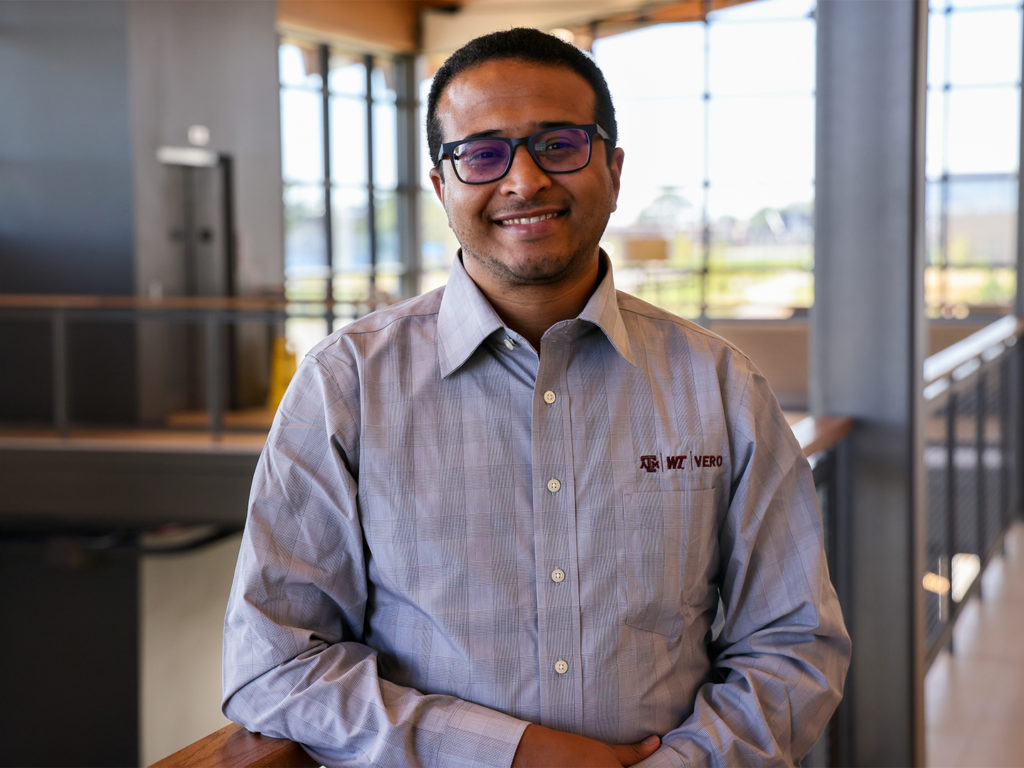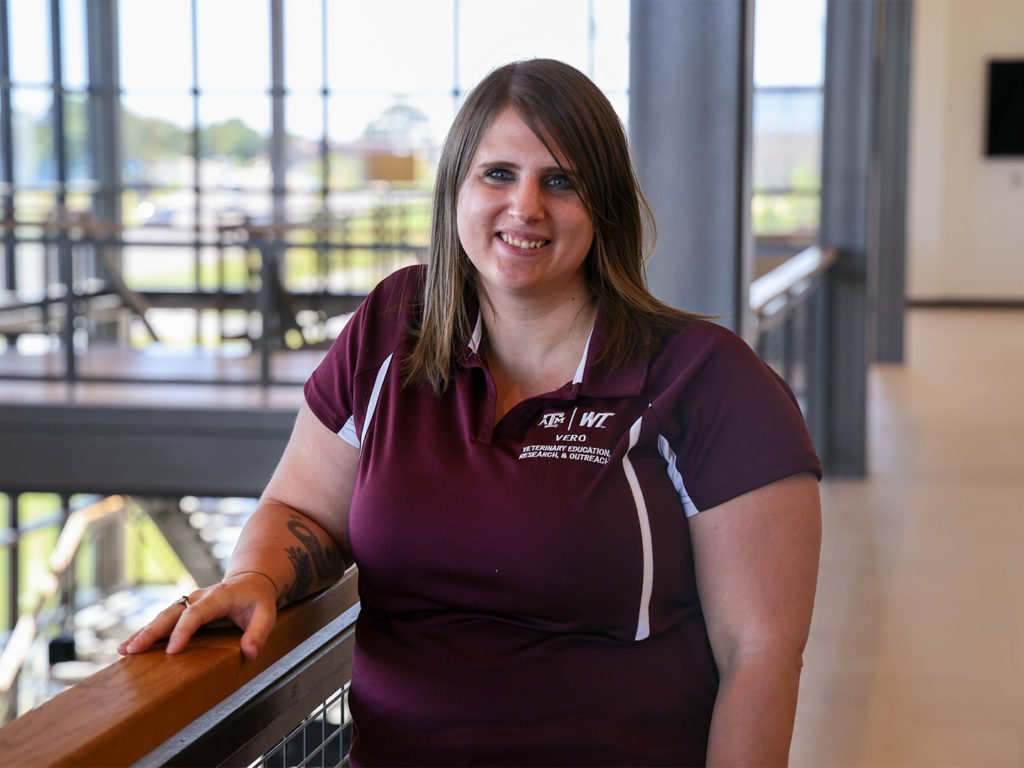VERO, TVMDL Partnership Brings New Faculty To 2+2 Veterinary Program
Story by Aubrey Bloom, CVMBS Communications
The search to find the most qualified educators for the Texas A&M College of Veterinary Medicine & Biomedical Sciences’ (CVMBS) Veterinary Education, Research, and Outreach (VERO) program has led to a partnership with the Texas A&M Veterinary Medical Diagnostic Laboratory (TVMDL).
Two new hires in the CVMBS’ Department of Veterinary Pathobiology (VTPB), Dr. Hatem Kittana and Dr. Abigail Finley, not only have an academic appointment at VERO, located on the West Texas A&M University campus, but also serve as diagnosticians at the TVMDL’s Canyon Laboratory, located next door.
Through their joint appointments, Kittana and Finley will teach courses on infectious disease and pathology as part of the CVMBS’ new 2+2 Doctor of Veterinary Medicine (DVM) program at VERO, which enrolled its first class this fall, while also using their skills to benefit the Texas Panhandle region at the TVMDL, which focuses on animal health and identifying potential infectious diseases in the region’s various veterinary industries.
Dr. Hatem Kittana

Originally from Egypt, Kittana earned his doctorate in veterinary medicine at South Valley University in Qena, where he wrote a research proposal that would eventually lead to him doing research at the Iowa State University College of Veterinary Medicine. From there, he earned his Ph.D. studying bacterial pathogenesis at the University of Nebraska before completing a residency in veterinary microbiology at the University of Missouri.
Bacterial pathogenesis is the study of the process by which infectious agents actually infect and cause the disease in the host. For Kittana, the ability to stay in veterinary medicine, which was his passion as a student, but also bring in that expertise in bacterial pathogenesis made this an ideal position.
“This position is really the center of the Venn diagram of what I was looking for,” he said. “It’s going to give me this teaching flavor that I really love because I used to teach back home in Egypt, and it’s going to give me the diagnostic experience that I’ve been doing during my time in Missouri. I’ll be working closely with veterinarians and other stakeholders helping farmers and producers out here, solving clinical problems that they face on a daily basis when it comes to infectious diseases.”
On the education side, Kittana will be teaching the two agents of disease courses and said he’ll be introducing veterinary students to topics like antimicrobial resistance that will impact their entire careers.
“I’m looking forward to working with our veterinarians and veterinary students here and helping them understand more about bacterial pathogenesis, the role of antimicrobials, and how to avoid the excess use of antimicrobials. That’s something that’s become very important to me as a microbiologist,” he said.
Dr. Abigail Finley

Finley, an anatomical pathologist, didn’t start her journey to Canyon quite as far away as Kittana.
After earning her DVM at Ontario Veterinary College in Canada, she did an internship in diagnostic medicine and pathology at Kansas State before completing an anatomic pathology residency at Midwestern University in Arizona. In September, she earned a board-certification from the American College of Veterinary Pathologists.
That experience at Midwestern is part of why she was drawn to the opening at VERO.
“I was their first resident, so I had an experience with starting a new program,” she said. “You get to build it and shape it into something you can be really proud of, and that’s the opportunity we have here.”
The small cohort of students is another thing that attracted her to the position, and being able to combine the educational component with the diagnostics made it a great fit.
Finley will be teaching the two anatomical pathology courses, which focus on diagnosing diseases by looking at tissues. Since performing those diagnostics will be her role at TVMDL, she said she hopes to be able to bring some cases she sees at TVMDL to the classroom.
“There are only 18 students, so I look forward to being a little more personable, a little more creative in the classroom, and really getting to know this small group,” she said. “I really wanted to get an academic job, I really enjoy teaching, but I still wanted to do diagnostics. This is the perfect marriage where I’m teaching, but I’m doing biopsies and necropsies, too. And what I take from diagnostics I can use for teaching.”
Both Kittana and Finley said they’re excited to be part of the VERO team and continue to be impressed with the level of support provided both in Canyon and by the CVMBS administration in College Station.
“It’s been great,” Kittana said. “The group here is a really nice group. We’re already working closely as a team. Everyone is helping you try to find your way here and learn the resources available. Dr. Susan Eades (associate dean for administration) here at VERO is so supportive, always trying to helping us even on a personal level. And the group in College Station is very supportive and making sure that the students are doing well and making sure we’re doing well as well. It’s been a great ride so far honestly and I’m really thankful for all of them.”
Critical Partnership
According to Dr. Ramesh Vemulapalli, VTPB department head, these joint appointments with TVMDL were essential to making the two great faculty hires.
“Without this partnership, we would not have been successful in hiring these highly qualified faculty to VERO in Canyon,” he said. “These are disciplines where specialty certifications and expertise are required, and they need opportunities to practice their discipline.”
In College Station, they would provide diagnostic services at the Veterinary Medical Teaching Hospital (VMTH), but without a teaching hospital in Canyon, they reached out to TVMDL.
“We contacted TVMDL and realized that they had a need for this kind of expertise at their Canyon laboratory,” Vemulapalli said. “So they’re providing day-to-day diagnostic services at TVMDL as well as participating in educational and scholarly activities.”
###
For more information about the Texas A&M College of Veterinary Medicine & Biomedical Sciences, please visit our website at vetmed.tamu.edu or join us on Facebook, Instagram, and Twitter.
Contact Information: Jennifer Gauntt, Director of VMBS Communications, Texas A&M College of Veterinary Medicine & Biomedical Sciences, jgauntt@cvm.tamu.edu, 979-862-4216


